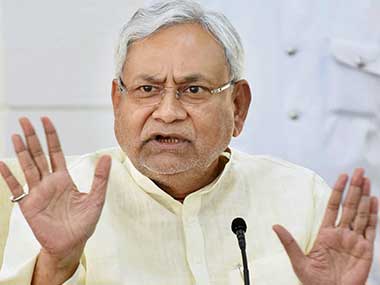Time was when Ramakrishna Hegde was the chief minister in Karnataka. A Brahmin by caste, he was beheld as a powerful leader for his moral standing, astute administrative skills and commitment to a political ideology consistent with the socialism of Ram Manohar Lohia and Jayaprakash Narayan. [caption id=“attachment_4332909” align=“alignleft” width=“380”]  File image of JD(U) president and Bihar chief minister Nitish Kumar. PTI[/caption] Much before Karnataka’s politics degenerated into a den of corruption, the state boasted a legion of political leaders such as S Nijalingappa who broke off from the Congress and aligned themselves with a new variant of politics that was egalitarian and averse to one-family dominance. Nijalingappa mentored Hegde and many others. From the 1960s till the 1990s, political socialism dominated the state before it got mutated into a virulent form of corrupt politics ceding ground to the BJP. In today’s Karnataka, it would appear to be a tale from a forgotten era to recall that Hegde resigned twice as chief minister on moral grounds: More so in a scenario where the state is believed to be fighting the most expensive elections in the country. Money has just been flowing like an unending stream of a mighty river, and not Cauvery, which is dried up for want of water. While driving in the state, one regularly comes across ATM booths which do not have cash. But cash is the king in this election. Take, for example, the pompous and unashamed proclamation of a candidate from a national party that he has earmarked Rs 50 crore for the elections: Several times the mandated expenditure limit. In effect, he plans to distribute money, which would mean nearly Rs 5,000 to each voter. His main rival is no less flamboyant when it comes to spending money. There are many constituencies where candidates have been spending recklessly and yet remaining under radar to avoid scrutiny. In such a setting, the discussion about socialism and its old proponents is not only irrelevant but also ridiculously archaic. This is the precise reason why Bihar chief minister Nitish Kumar was the odd man out when he came here on Sunday to campaign for the eight candidates of his Janata Dal (United). While driving down from Bengaluru airport, Kumar turned nostalgic and said, “This place used to be a bastion of the socialist leaders ranging from Nijalingappa, Virendra Patil, Ramakrishna Hegde and JH Patel to SR Bommai and HD Deve Gowda – not to forget the redoubtable George Fernandes…” Why did socialist leaders cede space to parties like the BJP? I asked, while prodding him to explain his perspective on the decline of a powerful ideology within a span of three decades. “You see, the problem arose as a large group of socialist leaders could not cohere as a group and also as leaders, though brilliant in their own right, they turned out to be individualistic”, Kumar said, looking forlornly at the hill-dotted landscape considered a BJP’s stronghold on account of significant concentration of Lingayats. Following the ritual of paying obeisance at the most prominent Lingayat Mutt in Tumkur to seek blessings of the 111-year-old seer, Shivakumara Swami of Siddaganga Mutt, Kumar said the significance of religion in public life was also undermined by a section of succeeding socialists who, by promoting cronies and their own family, went against the basic ethos of socialism. “Lohia was quite emphatic about respecting people’s sentiment irrespective of their religions and castes. He wrote a beautiful essay on Ram, Krishna and Shiva, and emphasised their relevance in contemporary context”, Kumar added. Kumar drove nearly 300 kilometres away from Bengaluru: To Davangere district, to campaign for his party candidate, Mahima Patel, son of former Karnataka chief minister JH Patel. He called other seven candidates of the neighbouring constituencies to Chennagere and made a fervent appeal to voters to bring fresh air to Karnataka politics, which is seemingly smothered by casteism, communalism and corruption. On the dais, Kumar deftly dealt with an uncomfortable question on his alliance with the BJP raised by one of the speakers. He said he had never compromised on corruption, crime and communalism notwithstanding his political alliance with any party. The astute politician that he is, Kumar is quite aware of the limited scope of his appeal in Karnataka amid the din of an election campaign punctuated by high-decibel rhetoric on caste and religion, and infused with cash on an unprecedented scale. On his way back, he recalled the manner in which Lohia turned around the country’s politics in 1967, only two decades after Independence, by helping throw out Congress regimes in many states. In a political atmosphere that reeks of slush money and subterfuge, such memories alone offer a whiff of fresh air.
The astute politician that he is, Nitish Kumar is quite aware of the limited scope of his appeal in Karnataka
Advertisement
End of Article


)
)
)
)
)
)
)
)
)



